Finding a legislation tracking tool that fits your newsroom’s needs
Six tools for tracking bills and topics across different states
The Appeal, a nonprofit newsroom that exposes systemic racism in the criminal justice system and spotlights alternatives to traditional methods of policing, was looking for ways to monitor evolving legislation across the country. Because every state’s government records its legislation differently, our goal was to find a tool that helps the Appeal find pertinent bills across the U.S. — and keep track of them as they change.
Their reporters were already using Google Alerts and Feedly to track news stories on topics like immigration enforcement and clemency. While we found many of the legislation-specific tracking tools were not priced with smaller newsrooms in mind, we tested several tools that had free versions for searching and creating alerts.
Testing multiple tools
We weren’t sure if we were going to find tools that tracked legislation exclusively or tracked news in general and then needed to be narrowed down by topic. Our original list of tracking and research tools are below.
- Tracking legislation: Bloomberg Government, FastDemocracy, BillTrack50, Juriscraper
- Tracking by news topic: DevonThink, MuckRack, Rolli, Exploding Topics
While Rolli has a helpful feature for finding experts in specific topic areas and Exploding Topics shows SEO performance of keywords and topics, initial tests proved that these tools did not provide the targeted search function we were looking for.
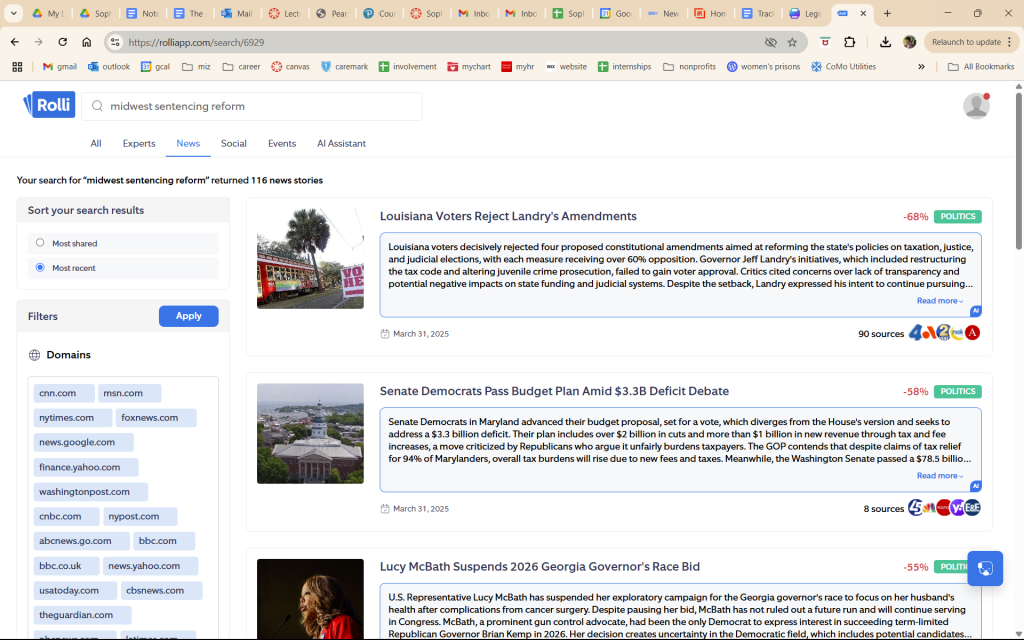
We determined through tests which features were the most important for the Appeal, so that we knew what to measure when testing these tools. We looked at pricing, whether the tool could compare legislation across multiple states, if it included an RSS feed, if it allowed for collaboration with multiple teammates, and if customer support was easy to access.
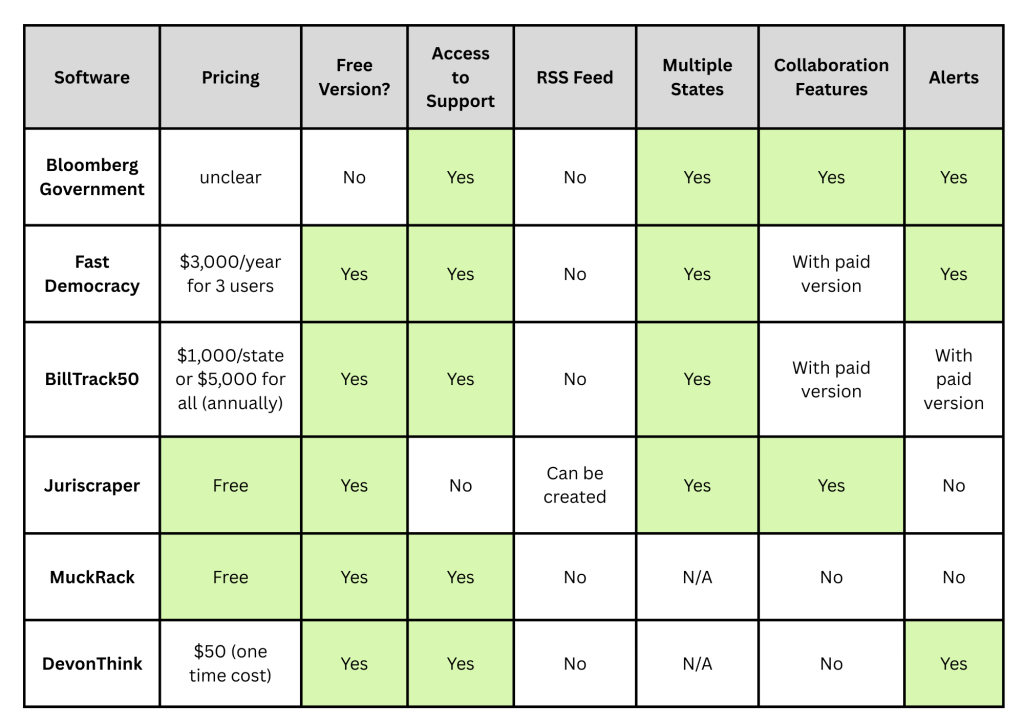
Bloomberg Government
Bloomberg Government is the most comprehensive tool we came across. Only when we met with a Bloomberg representative for a virtual demo did we receive a list of everything provided with purchase. Its most notable features apart from tracking bills are transcripts of Congressional hearings, directories of Congressional staff and lobbyists, and live updates from the House floor. Newsrooms that purchase Bloomberg Government also have access to an employee specifically assigned to them, who can answer questions about the tools and content.
All these features come at a steep price — one the company doesn’t quote without meeting with a member of your newsroom’s financial team. Since we decided this tool was more advanced than we needed before we presented them a budget, we don’t know exactly what it costs.
BillTrack50
BillTrack50 was the best tool for meeting The Appeal’s needs. Using the free version, you can search for bills by keyword or state. Each bill includes a summary, where the bill is in the legislative process, anyone who’s voted on it, any related documents, and the full text of the bill. Additionally, there is a very accurate “similar bills” tab which will find bills in other states that have similar language.
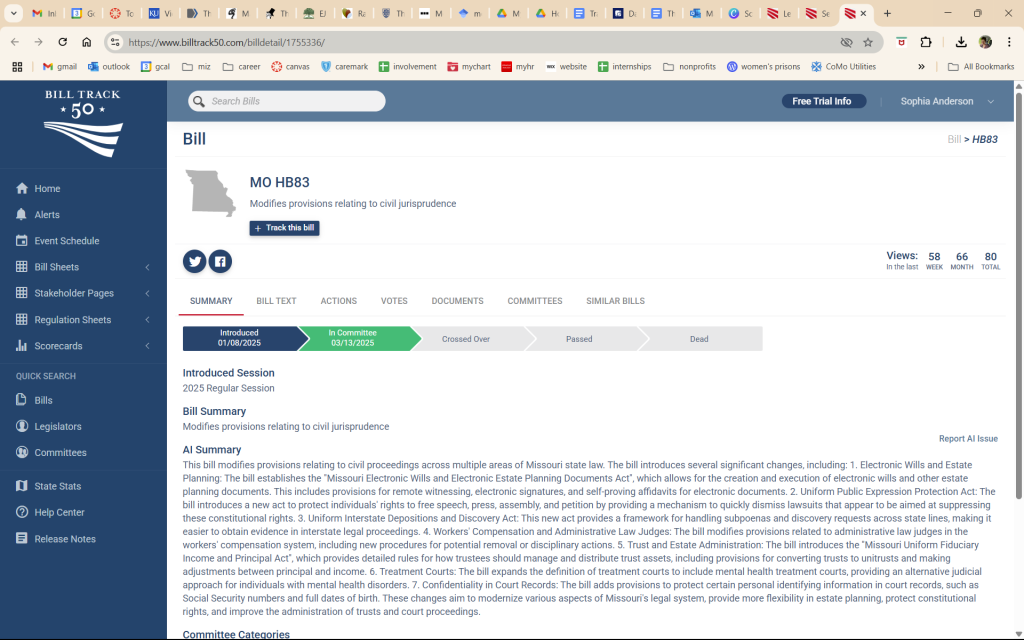
For the free version, you can only search for bills in the current legislative session. You can also search for legislators and committees by state or name.
The paid version allows you to create a query for a specific issue that will automatically update with any relevant bills that are introduced. You can get live alerts sent to your email and add members of your team to the topic you’re monitoring. BillTrack50 offers a 30-day free trial to test this version.
Here, we’ve created a bill query that collects bills related to immigration enforcement:
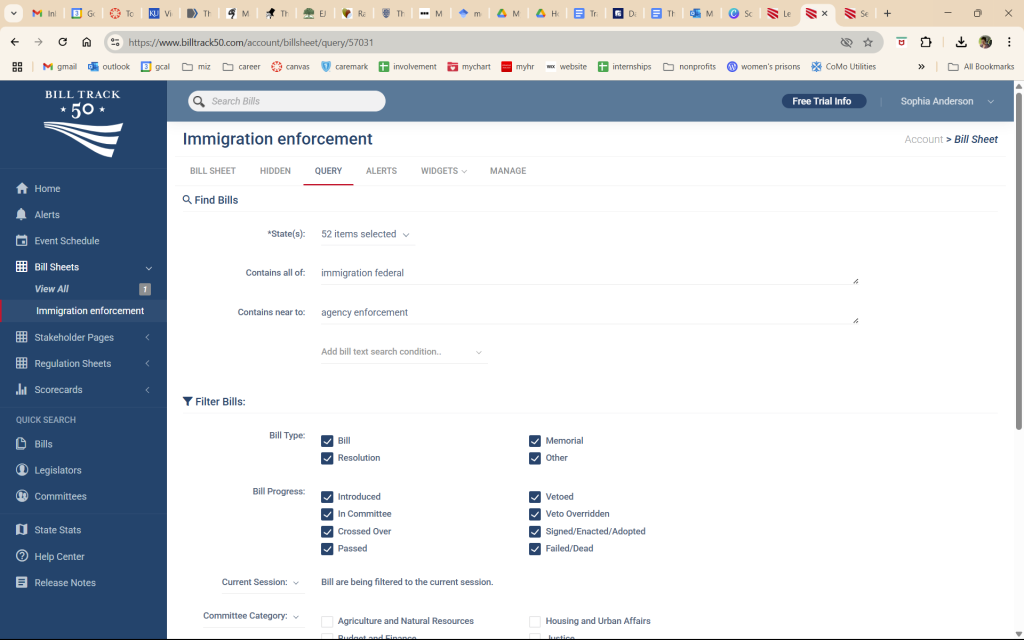
The Appeal was interested in setting up RSS feeds with their legislative tracking tool. An RSS feed is essentially a way for a website to update users about new posts or updates. None of the tools we looked at had built-in RSS feeds, but BillTrack50 had a way to set up alerts on Slack for updates to particular bills. That way everyone in your newsroom can receive those alerts in one channel.
How to set up Slack alerts with BillTrack50
You can set up an automation using a free Zapier account, so that all new alerts are sent to a specific Slack channel. Here’s how:
- Create a new Slack channel. We labeled ours “bill-tracking-alerts.”
- Create a new Gmail address and add it as a new user on your BillTrack50 account. Turn on alerts for that email address in the specific Bill Sheet you want to track. Note: BillTrack50 suggests creating a new Gmail address that you only use for this automation because of past issues they’ve had with the automation.
- Use the Email by Zapier app to create a Zapier email account.
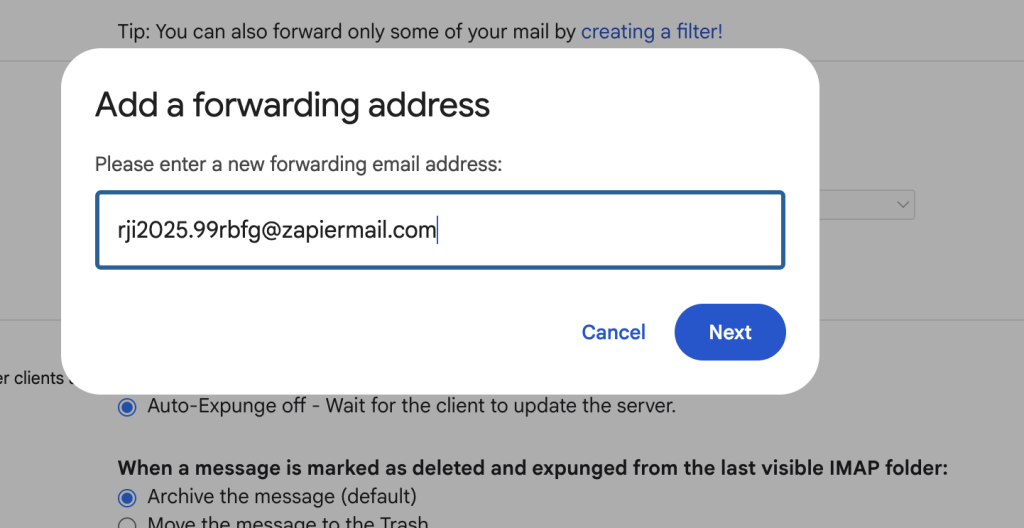
- Create a filter in Gmail to forward all emails containing “BillTrack50” to the Zapier email address.
- Create a Zap (or an automation) in Zapier so that all new emails to that Zapier email address go to the Slack channel.
Zapier Tip: When configuring the “Send Channel message” step, make sure to include the “Body Plain” option in the Message Text box.
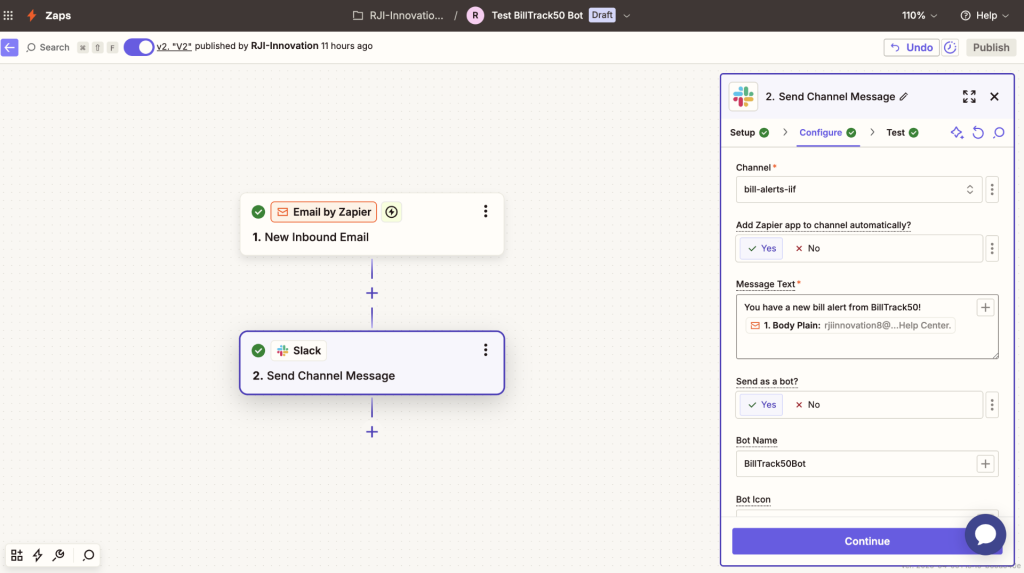
Then, all new emails containing “BillTrack50” showed up in that Slack channel. The formatting isn’t ideal, but it’s a good start.
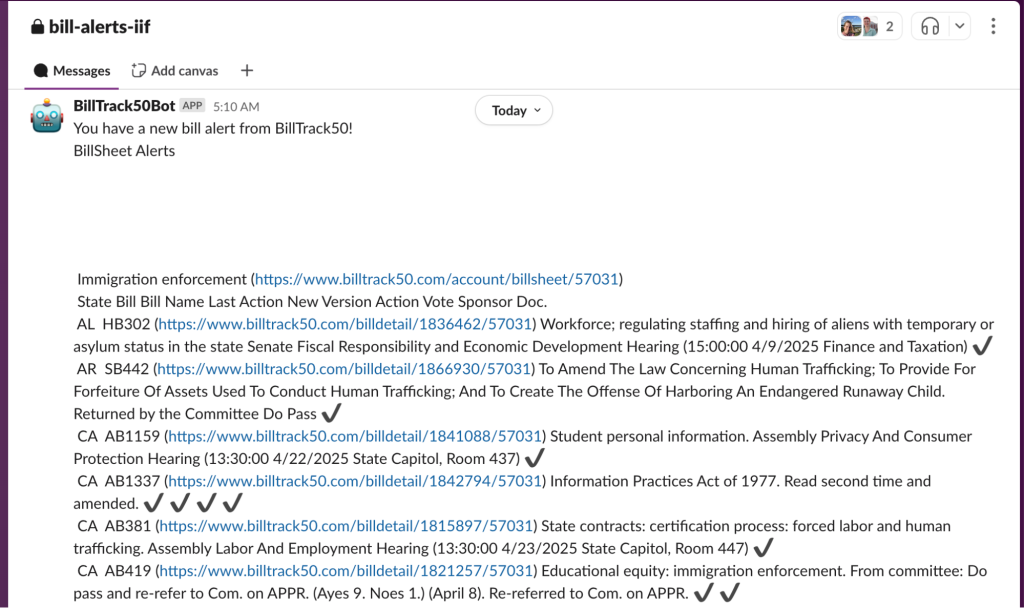
FastDemocracy
With the free version of FastDemocracy, you can search for a bill within a state and session (going back to 2013) using a keyword. You can also search for a specific sponsor of a bill.
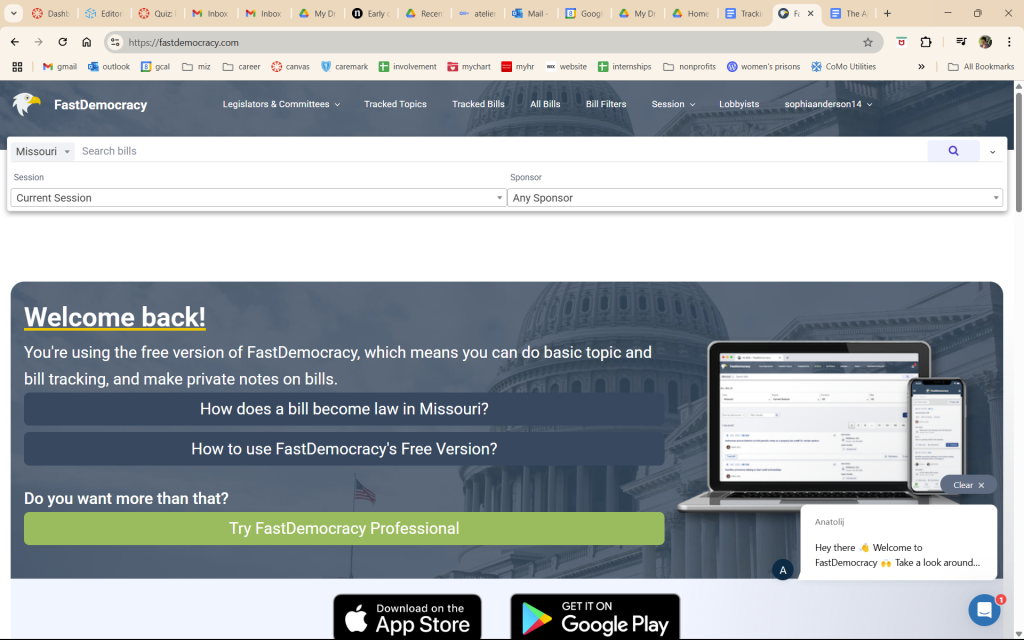
Once you select the bill you’re looking for, it provides a summary, bill text and list of actions on the bill.
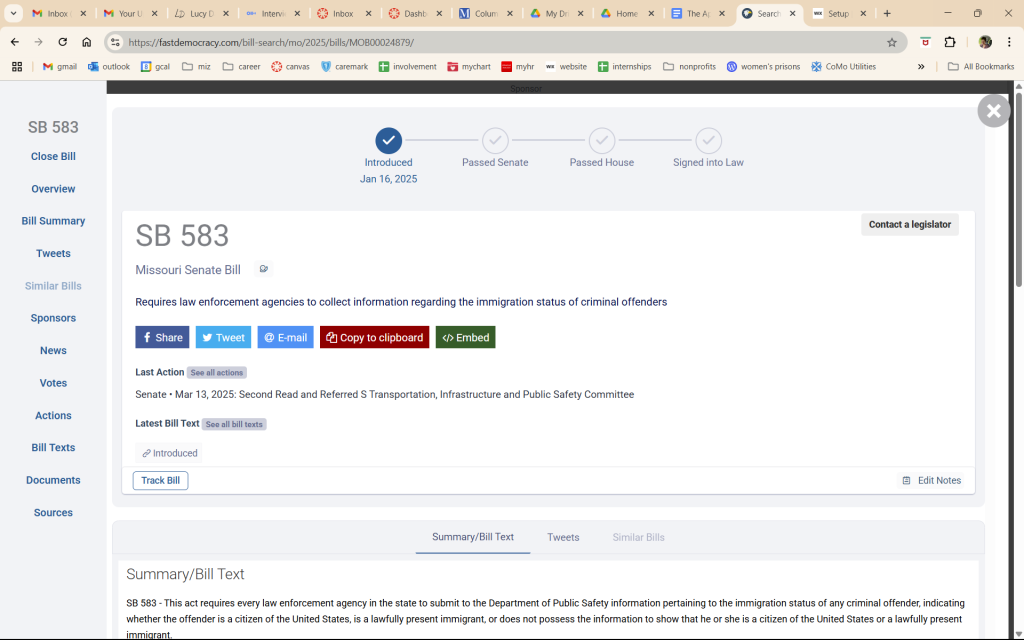
The paid version, which costs $3,000 per year per state or $10,000 for all 50 states, comes with more features. It allows you to compare bills from different states, get live alerts about bills and collaborate with other people in your newsroom. You can choose bills and topics to track and FastDemocracy will send you alerts by email. It also includes a line of HTML to embed the bill into your own website.
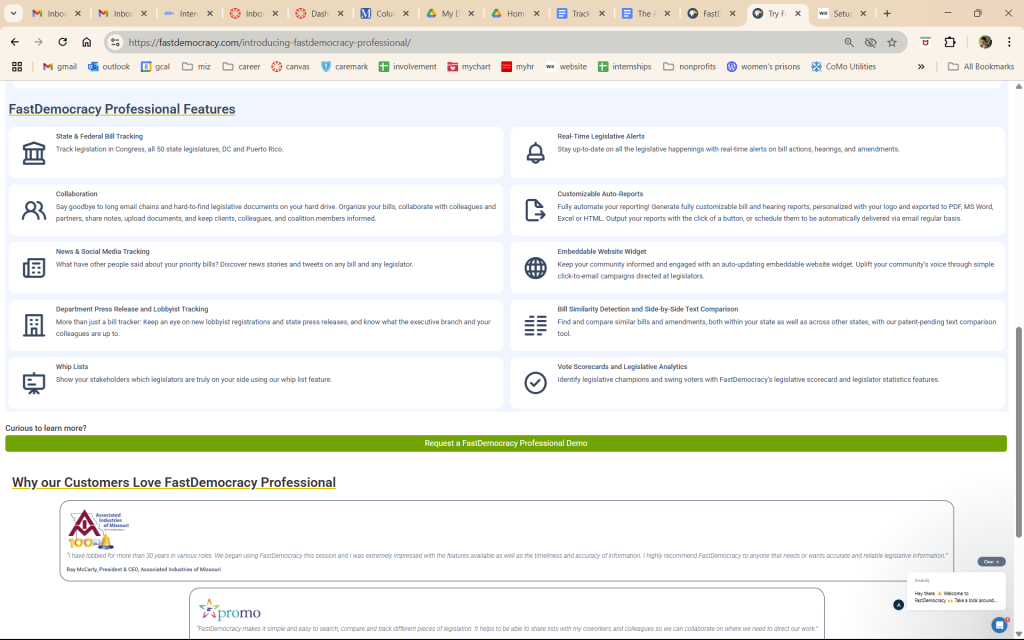
The premium version also monitors Twitter and various news sites for mentions of the bill. This feature rarely turns up results because it monitors only for exact mentions of a bill’s name. For example, unless someone’s Tweet contains “HB1334,” FastDemocracy won’t catch it.
If you’re only covering one state, FastDemocracy’s free version may be a good option, but we preferred BillTrack50’s free search function since you could search for related legislation in multiple states at once.
Juriscraper
Juriscraper is a coding tool made by the Free Law Project and posted to GitHub. It’s capable of pulling opinions from major federal appellate courts and state courts. It requires a moderate level of coding experience in Python. You have to download Python, install the necessary dependencies (additional software needed as a framework) and a WebDriver to help navigate the websites you’re scraping data from. It has lots of information on how to use the code on GitHub, but we wouldn’t recommend it to newsrooms who don’t have coding experience.
MuckRack
MuckRack allows you to search news outlets for a topic, filtering by date, language, domain, and a few other fields. As an example, we wanted to learn about news coverage of immigration enforcement laws in the Midwest.
We searched for “immigration enforcement” from news outlets in the United States written in English. We chose outlets with high domain authority, meaning they rank high on search engines. We wanted articles from the last month and excluded anything written in blogs, because we wanted official news sources. Finally, we selected the following topics: sentencing, litigation, supreme and high court, court, trial, civil law, police and civil rights.
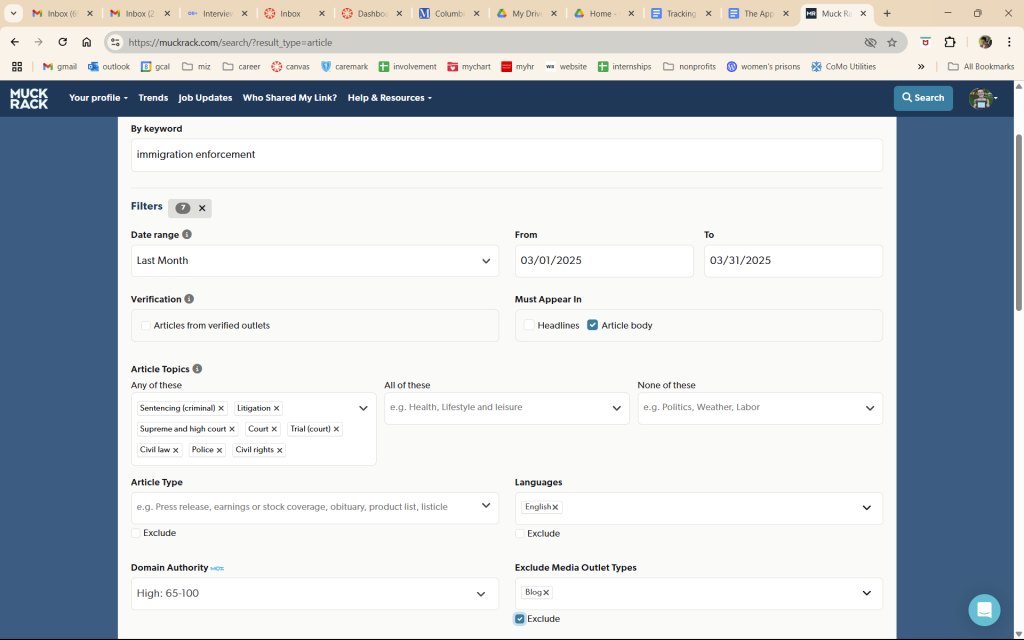
This search returned almost 6,000 results. To view more than the top five, you have to verify your account by linking your Twitter and listing the publications you write for. MuckRack only allows you to set up alerts once you verify your account.
DevonThink
DevonThink is a desktop application that only works for Mac devices at the moment. It has several different features, but the relevant app for our purposes is called DEVONagent, which is essentially an extremely powerful search engine. You can test it for $4.95 or pay $50 for lifetime access.
When searching for information on a topic, you can choose the sites it searches and the file types to return. Not only does it look for a keyword on individual websites, it will follow links within web pages to other web pages. You can choose how far back in time it searches and how obscure of results you’re looking for.
Once you click on a search result, DEVONagent will remember that you’ve viewed that result and won’t show it to you again. You can save certain search results or queries to come back to later. You can also create custom search engines that combine the places you search the most. For example, if you want to look for a result on Google, Yahoo news and the BBC, you can combine those into one search engine.
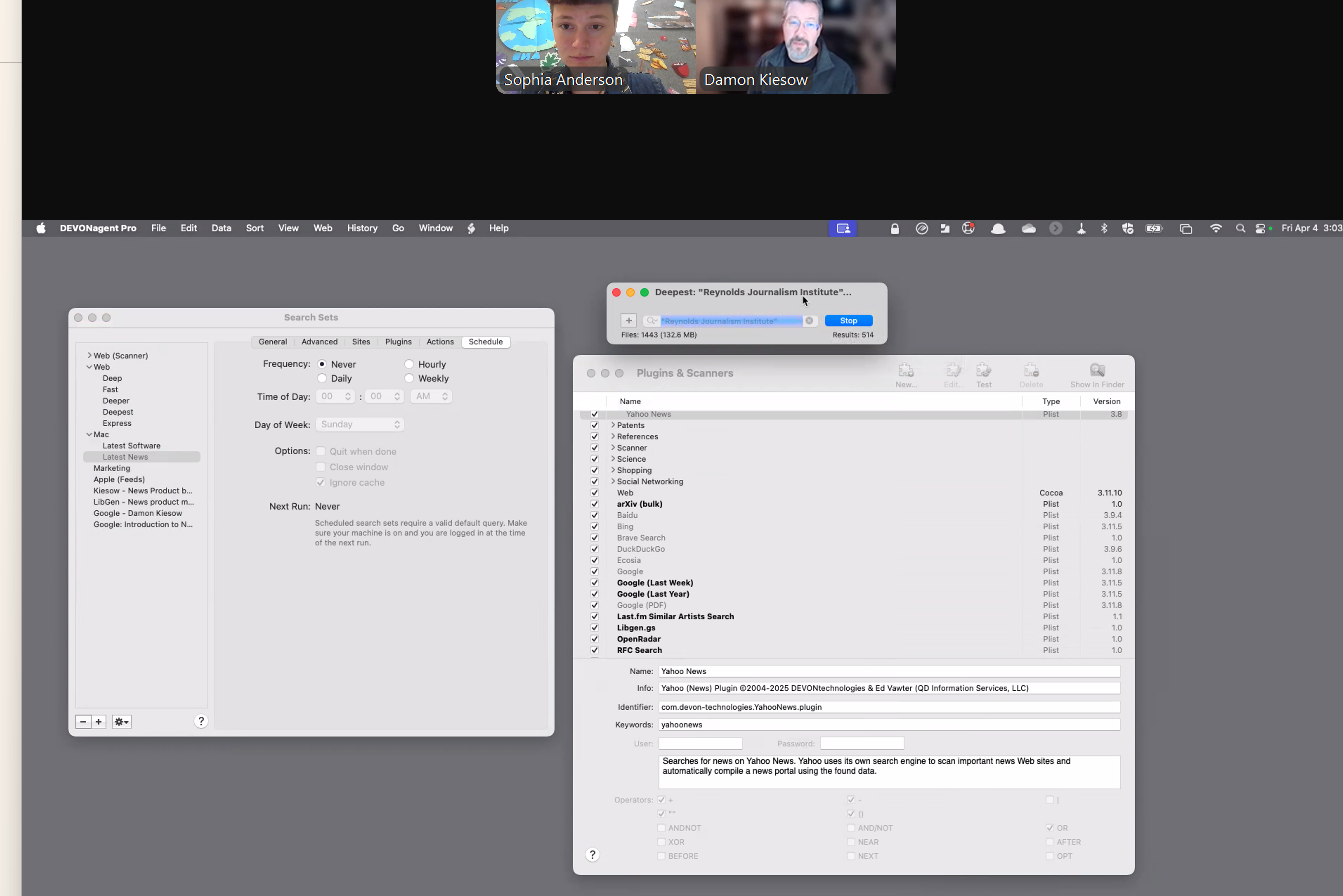
Here’s an example of how we might use DEVONagent to monitor deportations occurring due to changes in immigration law. We could search Google, The New York Times, The Washington Post, The Boston Globe, LA Times and the Chicago Tribune for the keyword “deportation” over the last six months.

Sign up for the Innovation in Focus Newsletter to get our articles, tips, guides and more in your inbox each month!
Cite this article
Anderson, Sophia (2025, April 18). Finding a legislation tracking tool that fits your newsroom’s needs. Reynolds Journalism Institute. Retrieved from: https://rjionline.org/news/finding-a-legislation-tracking-tool-that-fits-your-newsrooms-needs/
